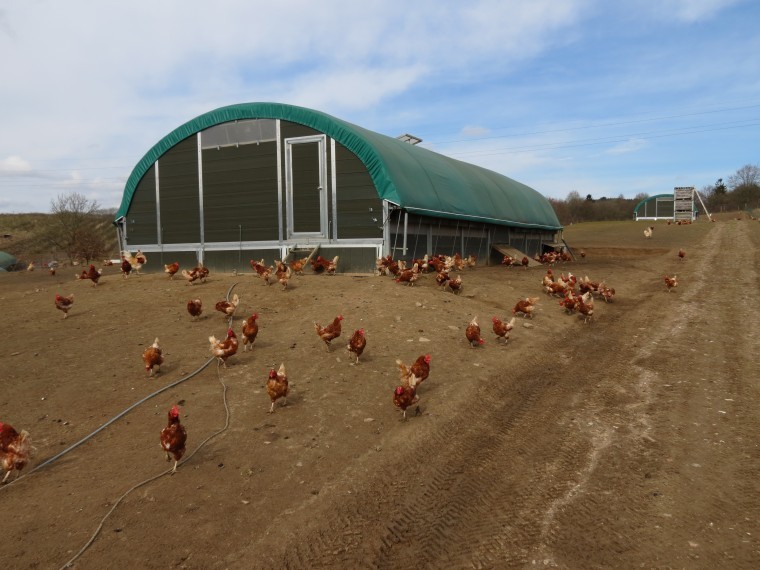In 2006 Daniel Hoeberichts arrived in Forest Row, East Sussex to help out on Brambletye Fruit Farm.
He was studying biodynamic agriculture in Holland, and the farm was looking for someone to do fencing. “It is an orchard and they had problems with deer and rabbits eating the fruit trees,” Daniel remembered. He was in England for just a week, but that was enough time for him to have an idea in the pub: if an orchard has a fence round it, why not put some animals into the orchard?
Daniel knew his plan would go well with biodynamic agriculture which is based on minimising inputs and sustainability. At that time, Brambletye Fruit Farm – which is next door to Daniel and his wife Karen today – was buying in chicken manure. “We thought if we produced the manure on site, it would double the use of the land by having chickens as well as fruit. But it was also an opportunity for us to start somewhere as neither of us was from a farming background.”
Holland was out of the question because land is so expensive – about three times its cost in the South East of England. When the Hoeberichts left Holland in 2008, land was about £75,000 a hectare.
At that time, the market in Holland was so competitive that the Hoeberichts would have been producing eggs at the cheapest price – which did not fit with their aim of producing locally in a sustainable way. Luckily, the opportunity came up at Forest Row, and the Hoeberichts decided to move to England.
Brambletye Fruit Farm offered them the land in return for the chicken manure and a bit of rent. “The rent was based on production, so it allowed us to start really small and increase production over the years.”
On 1 May 2008, Karen and Daniel arrived in England off the ferry and immediately heard on the radio about the economic crisis. The first batch of birds had been ordered and was almost ready to go to Orchard Eggs, the Hoeberichts new home where they were living in a static caravan. In the two years before they arrived, they had been commuting between Holland and England every other weekend to build the poultry houses and complete the fencing.
They started the business with 1,550 chickens and had talks with organic wholesalers who were keen on biodynamic eggs because they were not widely available in England. But the crash hit the wholesalers like everyone else, and by the time the Hoeberichts contacted them with their first production run of eggs, the wholesalers had changed their minds. They were looking for a cheaper product rather than a more expensive one because the market had shifted so much.
But the Hoeberichts were determined to stick to their principles and did not want to go down market. “Suddenly, we had pallets and pallets of eggs and we didn’t know what to do with them,” Daniel remembered. Luckily, the wholesaler who supplied Orchard Eggs with egg packaging helped with contacts so the eggs could be sold cheaply in bulk.
A decision had to be taken, so rather than organic wholesalers the Hoeberichts opted for local shops to sell their eggs. Through a combination of a top quality product, explaining the story behind the eggs and offering improved customer service, they began to make an impact. All the shops are independent and were originally in Forest Row and East Grinstead, but now there are more further away.
It took about two and a half years to sell all the eggs produced and make a bit of money to invest in more birds. “There have been several times when we’ve said ‘If we don’t have a solution by Friday, we will call it a day’ and every time we have a solution by Friday.”




